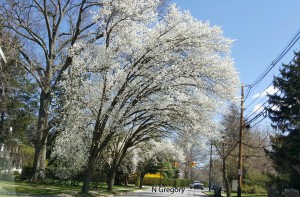BRADFORD PEAR trees are blooming now in Mid-Atlantic  landscapes. Also called callery pear, with some cultivars such as Cleveland Select, the flowering pear trees are native to China. Weak in branch structure, these V-shaped trees usually split or lose branches after 15 to 20 years of growth. Thought to be sterile and not produce fruit (just flowers) callery pears do cross pollinate with other pear trees in the landscape, and some do produce fruit. The fruit are small and inedible, but are eaten and carried by birds, ultimately seeding in areas such as roadside ditches and easements. Roadsides are populated with these invasive, volunteer flowering pears, more numerous over time, and some have thorns. Many other small flowering trees are much more suitable for planting. Consider native trees, such as fringe tree, serviceberry, or redbud. Callery pear, Bradford pear, or any of the selections from those, are not good options for purchase or planting. See the Plant Invaders of Mid-Atlantic Natural Areas and the associated web site of the National Park Service: https://www.nps.gov/plants/alien/pubs/midatlantic/pyca.htm
landscapes. Also called callery pear, with some cultivars such as Cleveland Select, the flowering pear trees are native to China. Weak in branch structure, these V-shaped trees usually split or lose branches after 15 to 20 years of growth. Thought to be sterile and not produce fruit (just flowers) callery pears do cross pollinate with other pear trees in the landscape, and some do produce fruit. The fruit are small and inedible, but are eaten and carried by birds, ultimately seeding in areas such as roadside ditches and easements. Roadsides are populated with these invasive, volunteer flowering pears, more numerous over time, and some have thorns. Many other small flowering trees are much more suitable for planting. Consider native trees, such as fringe tree, serviceberry, or redbud. Callery pear, Bradford pear, or any of the selections from those, are not good options for purchase or planting. See the Plant Invaders of Mid-Atlantic Natural Areas and the associated web site of the National Park Service: https://www.nps.gov/plants/alien/pubs/midatlantic/pyca.htm
April 6, 2017 NFG
Tag: Bradford pear
Bradford Pear – Invasive Plant
 Bradford pear trees are blooming now in Mid-Atlantic landscapes. Also called callery pear, with some selected cultivars such as Cleveland Select, the flowering pear trees native to China are weak in branch structure. These V-shaped trees usually split or lose branches after 15 to 20 years of growth. Thought to be sterile and not produce fruit (just flowers) the callery pears cross pollinate with other pear trees in the landscape, and some do produce fruit. The fruit are small and inedible, but are eaten and carried by birds, ultimately settling and seeding in areas such as roadside ditches and easements. Roadsides are populated with many volunteer flowering pears, more numerous and invasive over time. Some have thorns. There are many other small flowering trees that are more suitable for planting. Consider native trees, such as fringe tree, serviceberry, or redbud. Callery pear, Bradford pear, or any of the selections from those, are not good options. See the Plant Invaders of Mid-Atlantic Natural Areas and the associated web site of the National Park Service: https://www.nps.gov/plants/alien/pubs/midatlantic/pyca.htm
Bradford pear trees are blooming now in Mid-Atlantic landscapes. Also called callery pear, with some selected cultivars such as Cleveland Select, the flowering pear trees native to China are weak in branch structure. These V-shaped trees usually split or lose branches after 15 to 20 years of growth. Thought to be sterile and not produce fruit (just flowers) the callery pears cross pollinate with other pear trees in the landscape, and some do produce fruit. The fruit are small and inedible, but are eaten and carried by birds, ultimately settling and seeding in areas such as roadside ditches and easements. Roadsides are populated with many volunteer flowering pears, more numerous and invasive over time. Some have thorns. There are many other small flowering trees that are more suitable for planting. Consider native trees, such as fringe tree, serviceberry, or redbud. Callery pear, Bradford pear, or any of the selections from those, are not good options. See the Plant Invaders of Mid-Atlantic Natural Areas and the associated web site of the National Park Service: https://www.nps.gov/plants/alien/pubs/midatlantic/pyca.htm
NFG 3/30/16
